73 Search Results for PECS
August 5, 2013
by Robin Parker -

PrAACtical Thinking Free Text-based AAC Apps for the iPad PrAACtical Questions: Can Students Take Their AAC Device Home? PrAACtical AAC Learning & July 4th: Get Ready Get Set Go 4 Free July 4th Apps to SPARK Commenting 30 Posts You May Have Missed in June 4+AAC Tips for Talking About July 4th AFTER the Festivities PrAACtically Ready to Read Did You Know: AADMD Offers Specialty Webinars Visual Schedule Myths Live On..& On Getting to Yes Working with Worksheets Apps to Prepare, Learn, & Talk About Summer Vacations Modify a Battery-Operated Toy To Make It Accessible By Switches 5 Great Ways To Help People with AAC Needs Develop Inner Speech What’s the Connection: Core Vocabulary and Visual Schedules Random App of Kindness Giveaway: Talk About Food Create Your Own Style PECS Book 5 Things to Consider About Assigning ‘Homework’ to Your AAC Clients 8Friday Fun: 8 AAC Activities that are Fast... [Read More...]
April 5, 2013
by Robin Parker -
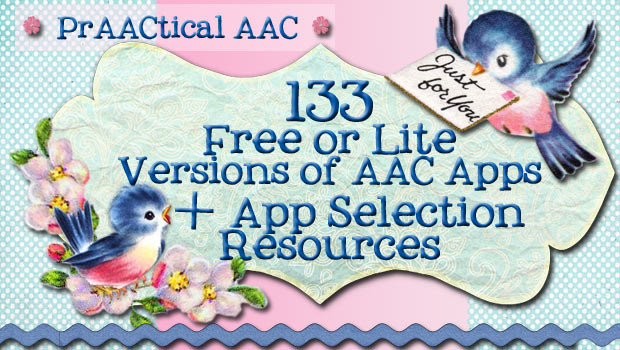
Here is our most recent update of free and lite versions of AAC apps for iOS and Android platform devices + a variety of resources related to AAC app selection. We strongly continue to advocate for a systematic process for AAC app selection. We recommend AAC app decision making in the context of a feature match process that gives appropriate attention to the full range of AAC options. Tools to Use In Making Decisions About AAC Apps Feature match form developed by Jessica Gosnell at Boston Children’s Hospital Feature match checklist created by Scott Marfilius and Kelly Fonner Our supplemental rubric covering language and communication features, RELAAACs Places to Go to Find AAC Apps and Reviews Comprehensive AAC app list for iPhone and iPad by Jane Farrall AAC Tech Connect’s Apps Assistant OCALI’s listing of apps for individuals with ASD Tech in Special Education Aidis Trust Communication App Reviews Training... [Read More...]
February 1, 2013
by Carole Zangari -
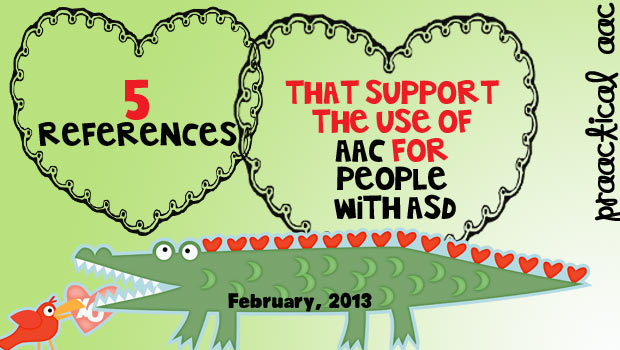
We occasionally get asked to provide empirical supports for some of the AAC tools and strategies used in our clinical work and teaching. Here are five references that we wanted to pass along. Ganz, J.B., Earles-Vollrath, T.L., Heath, A.K., Parker, R.I., Rispoli, M.J., & Duran, J.B. (2012). A meta-analysis of single case research studies on aided augmentative and alternative communication systems with individuals with autism spectrum disorders. Journal of Autism and Developmental Disorders, 42,1, 60-74. Systematic review of 24 single subject experimental design (SSED) studies investigated the impact of AAC interventions and concluded that aided AAC interventions had positive effects on communication and behavior skills. Although all picture-based AAC systems were effective, learners did best with SGDs or PECs. Checkley, R., Reidy, L., Chantler, S. Hodge, N., & Holmes, K. (2012). “Black white zebra orange orange”: How children with autism make use of computer-based voice output communication aids in their language... [Read More...]
January 5, 2013
by Carole Zangari -
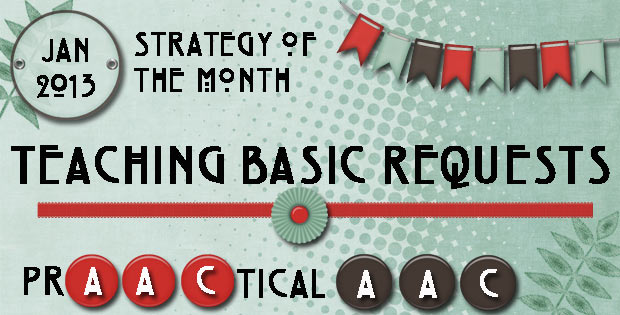
With the start of the new year, we thought it would be a good time to get back to basics. So this month, we’ll talk about the nitty gritty of teaching basic requesting to someone who is first learning to communicate using AAC. For learners who are not sending purposeful communication signals or those who seem unaware that communication involves interaction with another person, we think it makes sense to consider using the PECS curriculum. Why? Because the act of being assisted in physically giving a picture symbol to another person in exchange for a desired object can be an efficient way for someone to gain awareness of two critical principles. First, they learn that communication gives them the power to impact their environment. Secondly, the direct exchange highlights the fact that communication involves two people. As the PECS curriculum is already well established, its procedures will not be addressed... [Read More...]
December 7, 2012
by Carole Zangari -

Last month, we talked a lot about semantic intervention with people who are learning AAC. Once we got started, we realized we could have done another whole month on the topic, but we had to move on. We ran out of time before we could really talk about outcome measures. As clinicians, how do we determine whether our therapy is effective? Here are some things to do after you’ve provided high-quality, well-sequenced vocabulary instruction. Make small comprehension checks a regular part of your instruction. Ask the AAC learner to tell you about ___ . Then score their response as objectively as possible (e.g., complete & correct, correct but incomplete, vague, incorrect). You’ll get some real-time feedback and can clarify or re-teach as necessary. Assess in a standardized fashion. Standardized means doing something the same way each time. Set up appropriate assessment tasks that allow you to judge how well the... [Read More...]
June 8, 2012
by Robin Parker -
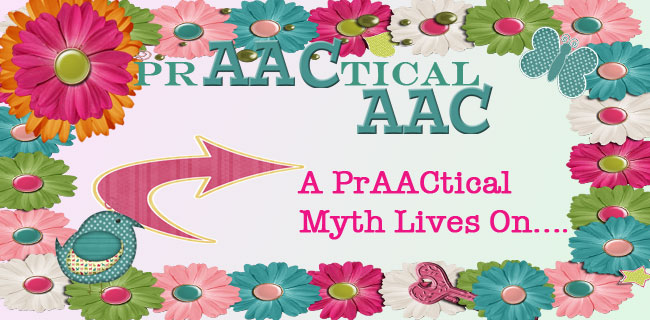
A myth about visual schedules continues to rear its ugly head in a prAACtical situation. Another family was instructed to discontinue a visual schedule because “the schedule will become a crutch, the schedule will result in dependence, and the schedule can not be used forever or all over town”. I need to start with an apology for not following up after my earlier post when I first realized that the visual schedule myth lived on. Maybe my punishment was hearing the same myth repeated (though it doesn’t seem fair that a student was impacted in the process). But maybe it was a teaching opportunity for me. It certainly made me respond quickly. So now for the down and dirty summary of my conversation with the other ‘professional’ . Having the conversation was my attempt at helping my student receive the visual language supports that she needed. I have to admit, it... [Read More...]
May 19, 2012
by Carole Zangari -
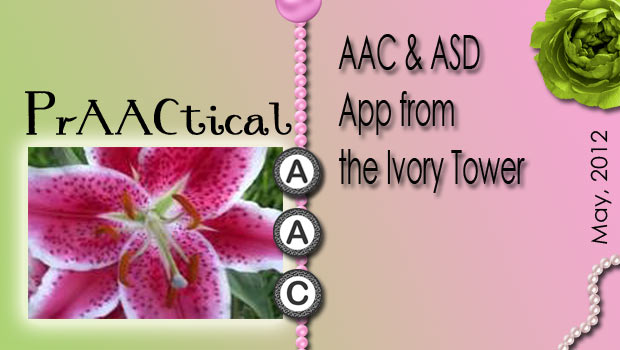
Today we pass the reins to Dr. Oliver Wendt from my alma mater, Purdue University. Purdue’s AAC program has made a great many contributions to the field and the tradition continues with the development of SpeakAll, an AAC app modelled after the PECS strategy. In this post, Dr. Wendt explains how a service-oriented project came to benefit so many individuals with significant communication difficulties. — – SpeakAll! An iPad App Addressing Particular Needs of Learners with Autism – An interdisciplinary team of Purdue University students from engineering, special education, and speech-language pathology has developed a simple and “lite” iPad app that takes into account the particular learning characteristics of beginning communicators with autism. This particular Purdue program is titled “Engineering Projects in Community Service” (EPICS). – The free app is called SpeakAll! and is available for download at the iTunes store here. SpeakAll! has been modeled after the Picture Exchange... [Read More...]
May 14, 2012
by Carole Zangari -
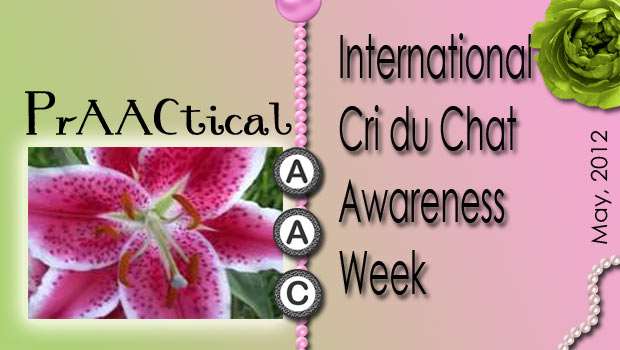
– Today’s post is in honor of the first ever International Cri du Chat Awareness Week and the lovely young lady pictured here (as well as in the brochure linked below). – Cri Du Chat Syndrome (CdCS, also called Lejeune’s syndrome and 5p deletion) is a low incidence genetic disorder caused by a deletion on the short arm of chromosome 5 (5p-). Most children with CCS experience general developmental and communication delays, some of which are quite significant. They tend to have strengths in receptive language. Their speech is often marked by frequent articulation errors, small phonetic inventories, and restricted syllable shapes. Many infants and children with CdCS also have feeding and swallowing difficulties. Children with CdCS have a higher co-occurrence of cleft lip/palate. – 1. 5p- Society (US) and the Annual Conference: Positive Attitude, Reaching New Heights (July, 26-29 in Denver, CO). This group also has a network of... [Read More...]
April 30, 2012
by Robin Parker -
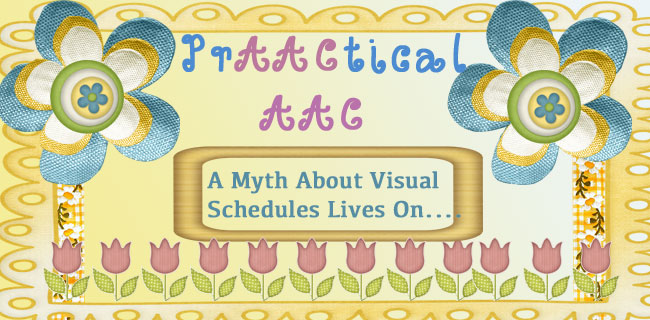
Nooooo, not again. A myth about visual schedules continues to rear its ugly head in a prAACtical situation (maybe we can reframe it into a learning opportunity??). Some history- A parent of twin girls with autism (age 15 and two other younger children– yes total 4) stopped by our office to pick up some autism awareness materials yesterday (a super busy mom in so many ways —going out of her way to help our community). As we were exchanging pleasantries and getting updates on how the girls were doing, we heard something that continues to surprise us–(and not in a good way). What did we hear? We heard that the girls were doing relatively well (not the surprising comment) but that mom was extra busy because the girls were no longer independent in taking their showers. They could do it by themselves but didn’t like the sensory input of soap... [Read More...]
April 21, 2012
by Carole Zangari -
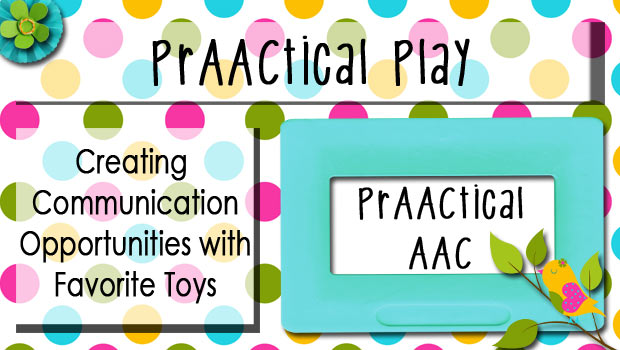
– Guest post by Stefanie Finocchio, M.S., CCC-CF As we’ve said before, we feel incredibly fortunate to have made our careers educating the next generation of SLPs. Sharing what we’e learned about AAC, AT, autism, literacy, and language intervention with graduate student clinicians is a challenge we both love. In this post, we share the wonderful ideas of a recent graduate, Stefanie Finocchio. Although she has only been out of grad school for a few months, Stefanie has some very prAACtical ideas about how to create communication opportunities for young children who are learning to use AAC. – One of my favorite “go-to” activities/games that I use frequently with my students diagnosed with autism is the Playskool Busy Gears game by Hasbro. It comes with 11 plastic gears of all different sizes and colors. Once a gear is placed on the board, you hit a button on the bottom and... [Read More...]









